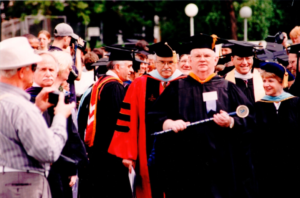November 24, 1936 — July 8, 2020
The most important thing my father ever taught me was the appropriate use of time-saving technology instead of finding nobility in unnecessary effort. When I was in my early teens, he was talking to me about having to perform the calculations in his electrical engineering classes with a slide rule. I asked if this was going to be a talk about how calculators were making Kids These Days lazy and dumb.
No! he exclaimed. Slide rules were a pain and I hated them. As soon as scientific calculators got under $250 I got one and it was the best money I ever spent.
I believe that this was an HP-35 that was remaindered after the HP-45 came out, as list price on the 35 when it was introduced was about double what he claimed to have paid. By the time we had that conversation, he had upgraded to an HP-55, which he kept for the remainder of his career, always preferring to use it plugged in rather than put batteries in. He never said why, but I suspect it was a matter of both thriftiness — those early HPs chewed through batteries like nobody’s business — and a desire to keep the calculator on his desk and not have the ability to dive into work wherever he was.
He was born into the back half of the Great Depression, grew up in a world convulsed by the most destructive war in history, and completed his education during the start of the Space Race. He was a frat brother of the guy who made modems possible. He founded the engineering department of a community college, the first in New Jersey. He spent decades until it was considered high enough quality that after the two year program, students were granted automatic transfers to Rutgers Engineering as juniors. He gave up being Dean to get back to teaching. Somewhere along the line, he testified to the Senate about the value of community colleges. As the longest-serving member of faculty, he led the procession at commencement.
He spent 20 years in retirement, in a world of ubiquitous pocket computers and all the knowledge of the world at his fingertips, which he found less interesting than reruns of NCIS. He’d been in declining health for years, and under home hospice care for the past couple of weeks. Around dawn, he breathed for the last time.
He was variously complicated, smart, confused (often at the same time), a little too willing to pack six children into a station wagon for cross-country drives, lazy, and fond of wine from the marginally drinkable to the top of the line. He was my father and I loved him.
Oh, and he’d want me to thank you for taking the time to read this. He was polite that way.
I’ll be back in a while; comments will be disabled until I return so I don’t have to deal with a mountain of spam when I get back. Behave until then.

The above comments are owned by whoever posted them. The staff of Fleen are not responsible for them in any way.